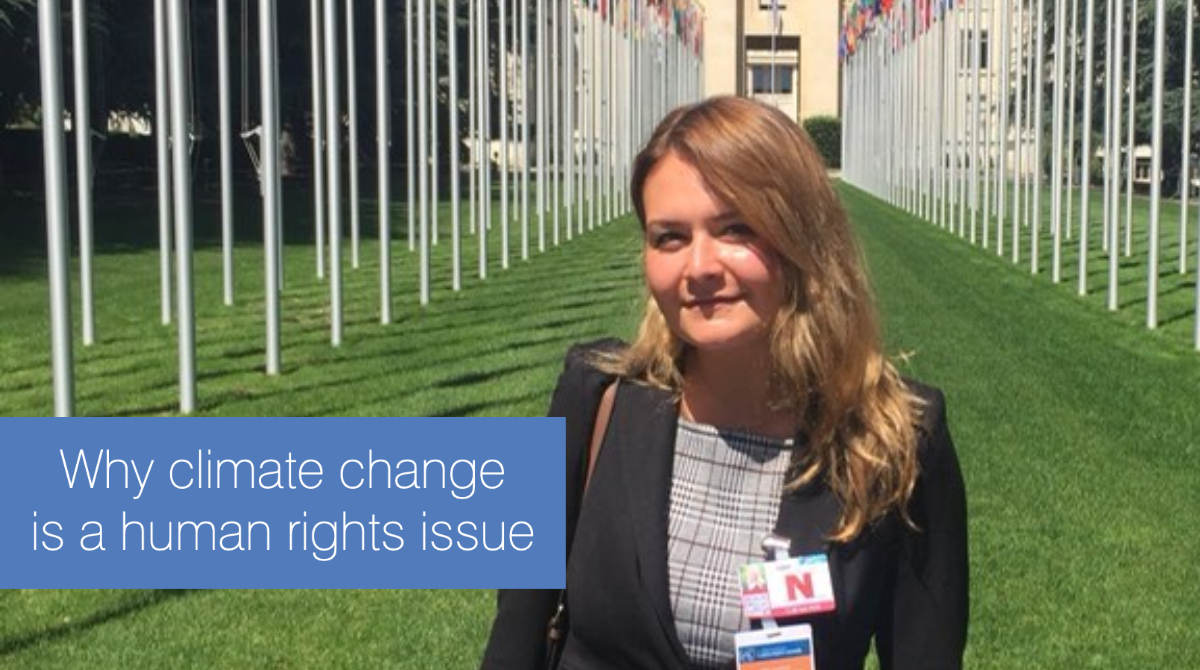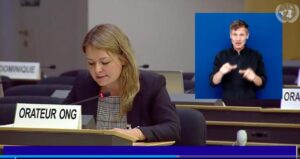Why climate change is a human rights issue

The United Nations recognises the climate emergency as one of the biggest threats to humanity. How will strides towards improving human rights be affected by our warming planet? Hear from Nina Pusic, a Global Environment and Climate Change Law student, who is currently undertaking an internship with the Center for International Environmental Law.
Throughout my LLM course at the University of Edinburgh, I have been learning how to foster environmental protection through law with a specific focus on climate legislation and litigation. As the most pressing issue pressing of our time, it is now more than ever that lawyers and law students must tackle the path to a Just Transition, through a Green Covid-19 Recovery, with the urgency it deserves.
This summer I have been incredibly privileged to work with the Center for International Environmental Law (CIEL), on their Climate & Energy Team as a Legal Intern alongside writing my dissertation. On the Climate & Energy team, I work with attorneys based in Geneva and Washington DC who are committed to tackling climate change through enhancing human rights legislation around the world. Incorporating human rights into climate law could not be more critical to a Just Transition away from a fossil-fueled society, and meeting our collective Paris Agreement targets of a well below 2°C warming by 2100.
As climate change threatens our human rights, those with the most to lose must be heard at the loudest volume.
CIEL’s mission is to utilise the power of law to protect the environment, promote human rights, and ensure a just and sustainable society. CIEL seeks a world where the law reflects the interconnection between humans and the environment, respects the limits of the planet while protecting the dignity and equality of each person. Therefore, the work that its Climate & Energy team is pursuing on Human Rights and Climate Change could not be more fitting. As an intern, I have recently had the privilege to speak at the United Nations Human Rights Council’s 44th Session, on its panel discussion of the rights of persons with disabilities in the context of climate change.
During my speech, I spoke to the member states on behalf of CIEL and its partner, Sustained Ability, on the vital importance of incorporating the voices of people with disabilities in the climate negotiation spaces, most notably at the UN Framework Convention on Climate Change. People with disabilities are some of the most vulnerable to climate-induced extreme weather events, with a far higher chance of dying in such disasters due to lack of accessible emergency evacuation infrastructure. Therefore, it is essential that people with disabilities, and other historically marginalised demographics, are at the epicentre of the decision-making process in spaces of climate legislation.

Nina speaking on behalf of Sustained Ability at the 44th session of the United Nations Human Rights Commission
Climate change fundamentally threatens all human rights, through compromising the ability of historically marginalised people to live on a habitable planet. Climate change is already causing, and will rapidly continue to cause, many people to be displaced from their homes, jeopardizing their human rights to life, the standard of living adequate for health and wellbeing, food, housing, and more. Climate-induced hazards such as sea-level rise, drought, flooding, and exacerbated extreme weather events are already disproportionately impacting the Global South, despite the fact that the world’s wealthiest 10% of people are responsible for 50% of greenhouse gas emissions.
Furthermore, juxtapose to international inequity when it comes to climate change, within regions and communities, people already subject to historic marginalization are made most vulnerable to these climate hazards. For example, people with disabilities, low-income communities, indigenous peoples, and others subject to social inequity, are all significantly more likely to be impacted by climate-induced disaster, yet are often neglected in the decision-making spaces of climate action. As climate change threatens our human rights, those with the most to lose must be heard at the loudest volume.
Working with CIEL has been instrumental to my understanding of how we must address these immediate challenges in the international environmental space. International law and order, at least in theory, is meant to uphold universal rights for all citizens regardless of nationality, in tandem with institutionalising normative guidelines of good governance. Therefore, the international legal community must do more in creating and upholding human rights that adequately address the harm and justice consequences of climate change, an emergency that knows no borders.
Only through institutionalising the rights of all citizens to a livable planet can we ensure that climate justice is universally upheld, and used as a legal basis to hold states and corporate actors accountable for their climate action or lack thereof. With all the work that needs to be done, I am very grateful to the Center for International Environmental Law and my LLM education at Edinburgh Law School for giving me the tools to enter this space and help advocate for our common future.





Recent comments